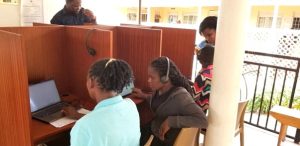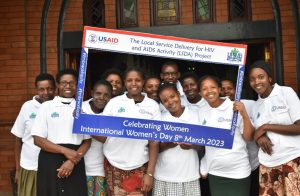Stories
Stories

A New Audio-Visual Technology Anticipated to Transform HIV Service Delivery
The collective fight against HIV/AIDS normally involves asking sensitive questions as a key to gathering necessary insights on an individual’s health and social relations. Given the nature of these questions, some people may feel uncomfortable and reluctant to respond accurately because they want to safeguard their privacy.
To overcome this drawback and ensure quality data, Ishaka Adventist Hospital adopted the Audio-Computer Assisted Self- Interview (ACASI) with support from USAID/Local Service Delivery for HIV/AIDS Activity (USAID/LSDA) implemented by Uganda Protestant Medical Bureau and USAID Strategic Information Technical Support (USAID/SITES).
This innovative method of data collection enables participants listen to pre-recorded questions through headphones and respond to questions by selecting their answers on a touch screen or keypad, all happening at the hospital.
Photo 1: Staff at Ishaka Hospital testing the ICASI platform
The new technology allows users or participants to privately answer sensitive personal questions on a computer with headphones in their local language. The innovation has the capability to assist clients with low literacy levels; whether they know how to use a computer or not.
Administered under the ART Clinic, ACASI has an automated electronic audio and video counselling platform where clients can go and get counselled on HIV/AIDS, substance or drug abuse, and mental health issues.
The adoption of ACASI by Ishaka Adventist Hospital will help improve quality data collection by minimizing data entry errors and reduce time to clean and monitor incoming data. It also has the potential to reduce the social desirability bias that may occur in face-to-face interviews.
This innovation will help Ishaka Adventist Hospital address traditional barriers like stigma and discrimination, which have been deterring individuals from seeking HIV testing and counselling service. It will also help in the identification of at-risk individuals, especially Key Populations.
Staff at Ishaka Adventist Hospital have been trained by USAID SITES in collaboration with USAID/LSDA to operate the system and assist clients in using it.

MANAGING GENDER BASED VIOLENCE AT HEALTH FACILITY AND COMMUNITY LEVELS
USAID Local Service Delivery for HIV/AIDS (LSDA) project improves treatment outcomes for persons living with HIV through facility and community initiatives to prevent, detect and address gender-based violence comprehensively.
For four years, Odongo Danish (not real names) struggled to find a place he could call “home”. Danish,19, lost his father when he was 10 years old. Growing up with a single mother and three siblings at Bar Dege cell – Layibi division, Gulu city. Danish’s mother could hardly provide for the children as her income from running a grocery stall at the village market was hardly enough.
In 2016, Danish’s paternal uncle took him in his care. His single mother felt a big relief but, little did she know it was the beginning of a horrible life for her son. From the time Danish joined his uncle’s family, he had a gruesome experience, heavy house chores, physical abuse, emotional stress and rationed meals. In 2020, he returned to his mother due to the difficult experience.
The violence affected Danish who had in 2012 tested positive for HIV and started antiretroviral treatment. He became nonresponsive to the health workers at TASO Gulu, missing appointments, his daily pills and moved from one home to another. Several counseling sessions were conducted by the TASO Gulu team with little improvement.
The Adolescent Clinician at TASO Gulu (White coat) discusses an Adolescents case with a Young People and adolescent peer support YAPS) at TASO Gulu (Photo credit, UPMB)
“I stopped ARVs for months, dropped out of school, became very irritable and not even my mother could say a word and l listen. l moved from one home to another. I reached a time and wanted to commit suicide,” narrates Danish.
USAID funded Local Service Delivery for HIV/AIDS Activity (LSDA), implemented by Uganda Protestant Medical Bureau (UPMB) supports 193 Private Not For Profit health facilities like TASO to provide HIV and Tuberculosis services at the facility and community including Gender Based Violence response services. This includes support to improve GBV clinical responses through mentorship and support supervision of PNFP health facilities and CSOs. Community and facility health workers are supported to focus on strengthening integration of routine GBV inquiry into all service delivery points, GBV case identification, referrals and management.
In January 2021, the TASO Gulu team identified GBV and its related psychosocial issues as the cause of poor adherence. To address the GBV, Young people and Adolescent Peer Supporters (YAPS) started conducting home visits to Danish’s home. His younger siblings, not on ARVs, were counselled and encouraged to support him adhere to his ARVs. His attitude towards life improved and He started voicing out his problems to his mother and the TASO Gulu team.
Danish later joined the adherence club meetings at TASO Gulu where His adherence to treatment improved and He began to share testimonies to other peers. He is currently virally suppressed and completed vocational training in motor mechanics. He supports his siblings through the income he earns from a garage workshop in the neighborhood.
Local Service Delivery for HIV/AIDS Activity (LSDA)
Uganda Protestant Medical Bureau (UPMB) | Plot 728, Namirembe, UPMB Close (off Balintuma Road), Mengo, Kampala, Uganda. Website: https://upmb.co.ug
For more information, contact the Chief of Party, Johnson Masiko on email: jmasiko@upmb.co.ug
November 2023
This success story is made possible by the generous support of the American People through the United States Agency for International Development (USAID). The contents of the story are the responsibility of UPMB and do not necessarily reflect the views of USAID or the United States Government

Differentiated Service Delivery for Multi Drug Resistant TB through Community Satellite Clinics – Strengthening linkage and retention in TB care
In mid-November 2022, the USAID Local Services Delivery for HIV/AIDS Activity Tuberculosis team were notified of a looming TB emergency in Namisindwa district. During one of the community hotspot TB screenings, the field team presumed eighteen cases. On testing, they were positive for TB but with multiple drug resistance. This situation was alarming since not many such cases had been found in the same location in a long time. The Ministry of Health was informed and a team of experts was set up to follow up this incident.
The first four cases identified were transported from Namisindwa to Mbale regional referral hospital for management. The shiftiness and attention with which the officers managed the situation scared the patients and community members. On the fourth day of admission, two patients escaped from the regional referral hospital. They entered Kenya through the porous borders along the Elgon escarpment.
With support from the Bungoma County Administration in Kenya, the two were returned to Uganda. They decried the loneliness and confinement that they had to go through while receiving treatment at the regional referral hospital. “The hospital is far from home, I started feeling bored since I did not have a caretaker”, narrated one of the patients.
Photo 1: A group of men drink a local brew “Malwa” at one of the local bars in Namisindwa district.
The USAID/LSDA team held stakeholder and community engagement meetings in the sub counties of Bukhoko and Bumbo. “Community dialogue meetings were held to sensitize the community on multi drug resistant TB (MDR TB). An MDR TB satellite clinic was set up at Bumbo Health Centre (HCIII), the centre of the hotspots. Health workers at Bumbo HCIII were trained in management of MDR TB” narrates Dr Dan Mugisha, the TB Advisor.
Figure 1Photo 2: A group photo at the Bungoma County offices in Kenya after the Ugandan delegation met the Kenyan team to resolve cross border TB monitoring/ tracking.
The MDR satellite clinic addressed the concern of patients having to move far from their homes and strengthening linkage of new MDR patients into care. Nasimiyu S, 36, is among the patients that were identified as having MDR TB in Talata village in Bumbo sub county. On testing positive for TB, all her contacts were traced and tested. She was referred for treatment to the MDR TB satellite clinic together with her daughter of less than 5 years.
“Ongoing hot spot screening and contact tracing has helped identify the disease burden of tuberculosis in Namisindwa district. It has empowered VHTs who have previously only been engaged in polio and other illnesses. The model that involves VHTs improves retention of clients and monitoring because these are community members and it is less expensive to trace the clients”, says Daniel Wakhasa, the TB Focal Person at Magale Health Centre IV.
As of March 2023, six months down the road, all the twenty patients that were diagnosed with MDR TB are still receiving treatment at the satellite clinic.
St. Elizabeth Magale Health Centre IV is among the private not for profit health facilities supported by the USAID Local Services Delivery for HIV/AIDS Activity. The health centre is a model facility in TB management in Namisindwa district.
Local Service Delivery for HIV And AIDS Activity (LSDA)
Uganda Protestant Medical Bureau (UPMB) | Plot 728, Namirembe, UPMB Close (off Balintuma Road), Mengo, Kampala, Uganda. Website: https://upmb.co.ug
For more information, contact the Chief of Party, Johnson Masiko on: jmasiko@upmb.co.ug
March 2023
This success story is made possible by the generous support of the American People through the United States Agency for International Development (USAID). The contents of the story are the responsibility of UPMB and do not necessarily reflect the views of USAID or the United States Government.
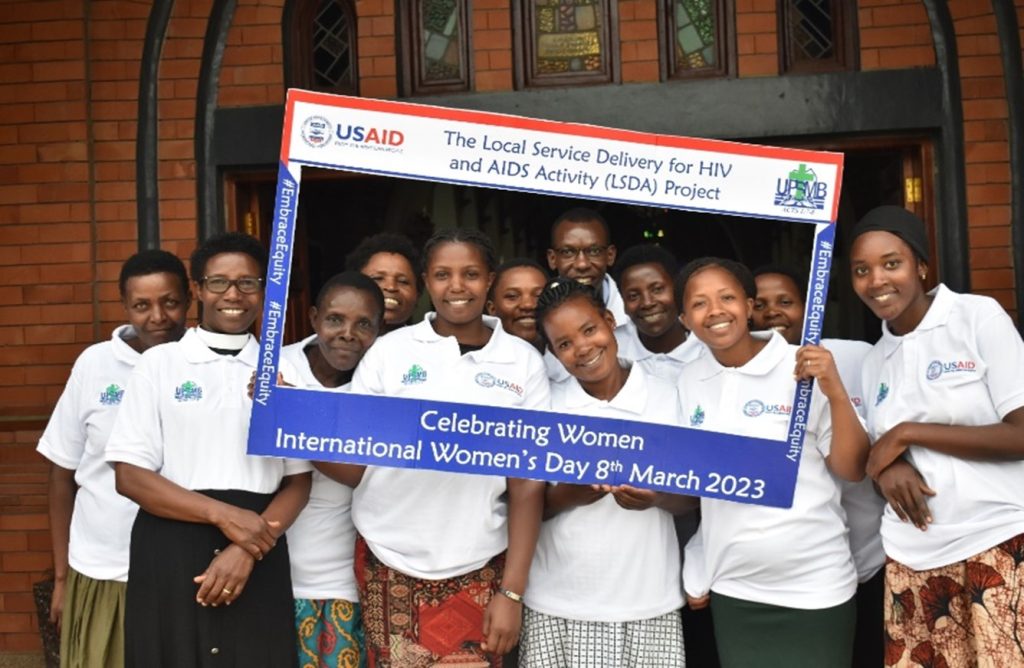
A Gender Based Violence Survivor Recounts How She Got Help from A Health Facility
“Where do I go now that home has becomes a living nightmare?” That’s the question that kept running in the mind of Kenteha Jovia (not real name), 43 years, a resident of Mbarara city.
Jovia lived with her husband with whom they were married for 10 years until 2022 when they separated. She was in an abusive relationship. Her husband was an alcoholic who had abandoned his responsibility of care to the family.
“He would shout at me and while he was at home, things were not always good. He wanted me to pay the house rent and buy food. When I tried to complain, he would threaten to kill me. I was in this situation for two years. I tried to get help from Police, but things did not work out.” Says Jovia.
Having failed to get help from the law enforcers, Jovia decided to talk to a Counsellor at TASO Mbarara, where she receives HIV treatment and care. She knew a friend who went through a similar situation like hers and was assisted by TASO. This motivated her to seek support from TASO.
At TASO, Jovia and her husband received counselling sessions to find solutions to their marital challenges. However, the alcoholism and threats continued despite the intervention. The counsellor wrote a referral letter to the LCI chairperson of Kiswahili cell to support Jovia.
Young girls pose for a photo with a Reverend after a GBV sensitization talk at church.
“The Counsellor wrote for me a letter which I took to the LCI Chairperson of my village. He knew my husband and his bad drinking habits. I resolved that I wanted the man out of my house since I was receiving no support from him. The LCI requested the man to remove all his things from the house. That’s how I regained my freedom,” narrates Jovia.
Young girls pose for a photo with a Reverend after a GBV sensitization talk at church
USAID funded Local Service Delivery for HIV/AIDS (LSDA) activity is working with 188 Private Not for Profit (PNFP) health facilities to respond to Gender Based Violence (GBV) through community and facility-based interventions. Gender based violence is a harmful verbal or physical act against an individual due to unequal power relations.
Between October 2022 and September 2023, LSDA served 7,502 GBV survivors. Among those served, 6,050 received post GBV care services, 1,452 post rape care and 510 received post exposure prophylaxis – a treatment given to HIV negative individuals after exposure to high-risk HIV events.
LSDA is providing post GBV minimum care package to survivors of Sexual GBV presenting at supported PNFP health facilities. These services are meant to prevent the spread of HIV and combat violence through providing referral services to other actors.
This success story is made possible by the generous support of the American People through the United States Agency for International Development (USAID). The contents of the story are the responsibility of UPMB and do not necessarily reflect the views of USAID or the United States Government.

MENTORING HIV POSITIVE PREGNANT AND BREASTING FEEDING ADOLESCENTS AND YOUNG WOMEN TO HAVE HIV NEGATIVE CHILDREN
Thirteen years ago, Franka, 27, was confronted with some unknown illness that she could only describe as; persistent cough, fevers and a skin rash. Franka and her parents did not know what was causing her to be sick. The parents took their teenage daughter to the nearby Health Centre for treatment, and she was diagnosed with HIV.
Franka was started on antiretroviral therapy (ART) and given medication to treat the infections that affected her because of her low immunity. After two months on treatment, Franka’s situation was worsening instead of improving. The counselors intervened and realized that the teenage Franka was not taking her medication. She was re-counselled, and her HIV status disclosed to her with the consent of her parents.
Photo 1: A young mother re-testing during post-natal care at the Young Child Clinic at a USAID/LSDA supported facility, Busiro Church of God in Namayingo District.
Growing up as a teenager, Franka had given up on life after realizing she was a young adolescent girl living with HIV. She worried that she would be unable to live life to the fullest and cope with taking daily ART medication. She occasionally missed her pills causing her to be virally non suppressed at certain times. Hopeless about her situation, Franka would think to herself, “there is nothing am living for, and even if I die anytime, am worth it”.
Franka’s frustration went on for a period of two years and the peak was when she tried to commit suicide. She crushed a full tin of antiretroviral drugs (TLE) and took all the powder at once. She was rushed to hospital and managed in time thus her life was saved.
Following Franka’s near-death incident, her mother reached out for support at St. Mary’s Hospital Lacor as opposed to the lower-level health center where they were receiving care. While at the Hospital she received support from the health workers and was attached to a counselor that availed psychosocial support both at facility and at home. She also joined family support groups at the Hospital where she and her mother would meet with other parents whose children are in HIV care and share experiences. At Lacor Hospital, Franka found purpose in life and her perception about her situation totally changed.
In 2016, while at Lacor, Franka met her husband, an ART client at the facility. The two got married and borne two lovely children that are HIV negative. When Franka conceived her first child, she was worried of passing on HIV to her unborn child. “I was enrolled into group antenatal care where I found young mothers of my age group and they shared their experiences with me about pregnancy and prevention of mother to child transmission and HIV exposed infant diagnosis (PMTCT/EID) services”, says Franka.
Photo 2: Young mothers turn up at the young child clinic with their infants at Kamuli Mission Hospital.
Today, Franka devotes her time supporting adolescent girls and young women (AGYW) and other mothers with HIV exposed infants (HEI). She gives them hope that it’s possible to live a complete and fulfilled life with HIV. She was identified to work with AGYW as a mentor mother at Lacor ART clinic supported by the USAID funded Local Service Delivery for HIV/AIDS (LSDA) project.
As we commemorate World AIDS day 2023, USAID/LSDA recognizes heroes like Franka who have given hope to many mothers that have raised exposed infants and guided them to HIV free lives. LSDA supports 192 private not for profit (PNFP) health facilities to provide HIV and TB care.
Local Service Delivery for HIV/AIDS Activity (USAID/LSDA)
Uganda Protestant Medical Bureau
Plot 728, Namirembe, UPMB Close (off Balintuma Road), Mengo, Kampala, Uganda https://upmb.co.ug
For more information, contact the Chief of Party, Johnson Masiko on email: jmasiko@upmb.co.ug
January 2024
This success story is made possible by the generous support of the American People through the United States Agency for International Development (USAID). The contents of the story are the responsibility of UPMB and do not necessarily reflect the views of USAID or the United States Government.
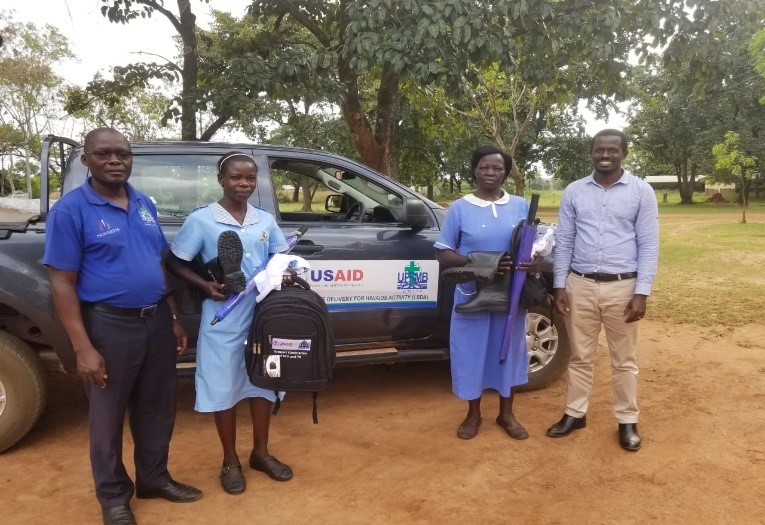
Equipping Community Linkage Facilitators in the LSDA Northern Region Supported HCIIIs with Protective wear
Community Linkage Facilitators (CLFs) are pivotal to delivery of targeted Community HIV/TB services. As health facility team members, they are experienced and model HIV clients whose capacity in HIV/TB service delivery is built through mentorships and trainings by health workers and Local Service Delivery for HIV and AIDS Activity (USAID/LSDA) regional teams.
Their critical roles include but not limited to; supporting HIV/TB case identification, health education, and counselling people living with HIV/TB, delivery of HIV/TB medicines to clients in the community; follow up of clients with Interruption in Treatment (IIT) and supporting timely updates for the HIV/TB registers. It was brought to the attention of USAID/LSDA of the hurdles they face through the course of supporting community activities among which included; dynamic extreme changes in weather, lack of tools to carry drugs and occasional resistance by the communities due to lack of identification.
In response to the outcry, UPMB through USAID support, managed to procure protective wear for the CLFs as a minimum package of work equipment/tools and these included Umbrellas, Bags, T-shirts and Gumboots. A total of 21 CLFs (11 males and 10 females) from all the Health Centers III’s in Northern Region (12 HCIIIs) were provided the protective wear with each receiving a pair of gumboots, a t-shirt, a bag and an umbrella.
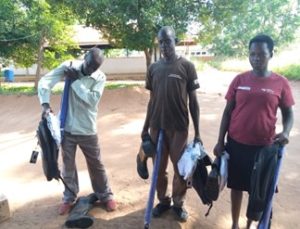 |
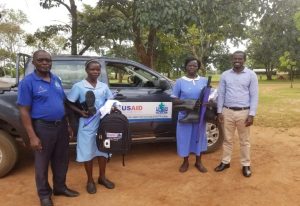 |
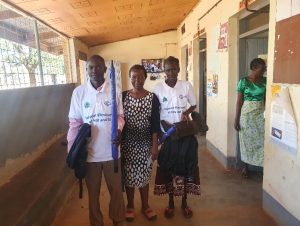 |
|---|
CLFs receiving the protective wear, Aliwanga HCIII (upper left), St Peter & Paul HCIII (upper right), Minakulu HCIII (lower left) and Alenga HCIII (lower right).
The CLFs in the 12 HCIIIs proudly expressed their gratitude to the UPMB USAID/Local Service Delivery Activity (LSDA) for promptly heeding to their request, and further pledged to carry out their duties with re-energized efforts as we work towards epidemic control.

